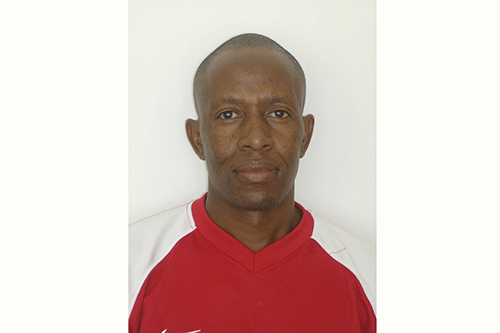After opening up about his life story and passionately narrating how he got into the sport of hockey during last week’s Throwback Tuesday, national women’s senior hockey team head coach and veteran administrator Erwin Handura, in this final part of our conversation, talks about the current state of hockey and what needs to be done to take the game forward.
Taking hockey to all corners
After steering Namibia’s senior women’s side to this year’s Africa Indoor Hockey Cup, the evergreen Handura has set himself another big goal and that is to help Namibia finish within the top three at next year’s Indoor Hockey World Cup in Belgium – something he says is achievable and worth dreaming about.
Not only is he passionate about the growth of the various national teams, Handura is equally zealous about the overall growth of the country’s hockey, especially at grassroots level and within all 14 regions.
“When I was involved with the hockey development programme between 1995 and 2002, I worked hard to make sure that hockey development reaches all 13 regions at the time (now 14 regions). Through those efforts, we saw that many players of colour are starting to come through and developing an interest in the sport of hockey. Over those years, we also won about six awards at the country’s annual awards ceremony for our development programmes. So, the continuous development of hockey is so close to my heart and something I have always been part of,” shared Handura, who remains one of Namibia’s most successful hockey coaches, having won 12 outdoor national titles and 13 indoor national titles as a coach.
However, believes that more can still be done to elevate the status of local hockey, especially on the development front – and that is by strengthening and expanding the existing development programmes at schools within all regions.
Currently the only local coach who has ever qualified Namibia to two Indoor World Cups, first in 2017 and for the second time in April this year, he says all is not doom and gloom for upcoming players, particularly those of colour – as programmes are being put in place to ensure hockey is played across the country.
Giving everyone an opportunity to showcase their talent
“During those years, especially early on in my coaching career, I think one of my success stories is that I made serious effort to make sure I select players of colour, who would otherwise not have gotten an opportunity to play top hockey for their country.
Through the national development programme, I had an opportunity to push through many black players and the results have not been so disappointing over the years. For instance, at the last World Cup, we had about three black players in the squad – and for next year’s World Cup, we are probably looking at having five or so. Not just at the World Cups, but also various other many continental competitions. I would try and give them a chance to represent their country at that level. So, I’m happy I could give those kids a chance to play and develop their talents,” said the soft-spoken Handura.
However, he says lack of coordination among clubs and the national structures has somehow reserved the little gains and efforts of developing black players, as not so many are breaking through from their club structures into the national teams, which is something that needs to be urgently addressed.
“We see them doing well at their clubs but breaking through to the national teams remains a problem because they are now becoming fewer and fewer. So, we need to tighten the relations and coordination between clubs – and also see how more hockey clubs can be established outside Windhoek, as that will also see more talented black players coming through from outside the capital. Again, schools will always be the perfect breeding grounds for talent; maybe the national hockey union needs to revise and revisit their hockey programmes at school levels – both at primary and secondary levels.”
Trying to catch up with the rest of the world
If Namibia is to catch up with the rest of the world, starting with Africa, Handura believes the country needs to invest more in facilities – and it is not just about building world-class facilities, but it should also be about building world-class affordable facilities.
“When you currently look at our local facilities here, they are very expensive because most are privately owned. One has to pay between N$800 to N$1 000 per day, just to use a hockey field for training – that is too much. So, affordable facilities should become a priority if we want to see more talents flowing through and more international success coming to Namibia. Not only that but making sure that our various national teams are competing regularly at the highest levels – both in Africa and the world – should also be a priority because that is the only way we can get better and catch up with the rest of the world.”
Handura’s coaching achievements are as follows:
winning bronze with the senior women’s team at the African Cup of Nations in Pretoria, South Africa, in 2005; winning silver with the senior women’s team at the 2015 IPT in Potchefstroom, South Africa; winning silver with the senior women’s team at the A-Four Nations Tournament between South Africa, Namibia, USA and Australia in 2015.
He also won gold at the 2017 Indoor African Cup of Nations and subsequently qualified for the 2018 Indoor Hockey World Cup in Berlin, Germany; won the 2017 Indoor and Outdoor national titles with UNAM women; won gold at the 2018 Africa Olympic Qualifiers Round 1 in Zimbabwe and another gold at the South African Indoor IPT in February in Durban.


